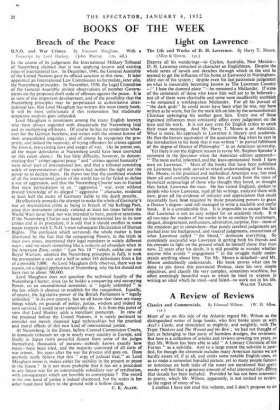BOOKS OF THE WEEK
IN the course of its judgement the International Military Tribunal of Nuremberg claimed that it was applying known and existing rules of international law. In December, 1946, the General Assembly of the United Nations gave its official sanction to this view. It later appointed an International Law Commission to formulate, inter alia, the Nuremberg principles. In November, 1950, the Legal Committee of the General Assembly invited observations of member Govern- ments on the proposed draft code of offences against the peace. It is in view of this important development, and of the possibility that the Nuremberg principles may be perpetuated as authoritative inter- national law, that Lord Maugham has written this most timely book. It will be most unfortunate if this remorseless but studiously temperate analysis goes unheeded.
Lord Maugham is prominent among the many English lawyers who have always regarded with disquietude the Nuremberg trial and its multiplying offshoots. Of course he has no tenderness what- ever for the German butchers, and writes with the utmost horror of their unparalleled iniquities ; and of course he recognises the pro- priety, and indeed the necessity, of trying offenders for crimes against the known, pre-existing laws and usages of war. (As he points out, all the major defendants at Nuremberg could have been convicted on this count alone.) He has little difficulty, however, in demon- strating that" crimes against peace " and" crimes against humanity" were never part of international law, and that a tribunal consisting solely of representatives of 'the victors had neither the right nor the power so to declare them. He shows too that the combined wisdom of all the international jurists of the world has so far failed to define a war of aggression, and that the Nuremberg Charter_was so framed that mere participation in an " aggressive " war, even without proved knowledge of its alleged " aggressive " character, rendered at least half the males of Germany liable to the death penalty.
He effectively unmasks the attempt to make the whole oWermany's War an international crime as being in breach of the Kellogg Pact, since that instrument (already violated at least ten times before the World War) never had, nor was intended to have, punitive sanctions. If the Nuremberg Charter was based on international law in its new crimes and in its procedure, it is odd that it should conflict in some major respects with U.N.O.'s own subsequent Declaration of Human Rights. The confusion which surrounds the whole matter is best illustrated by the fact that the conquering Powers, in the trials in their own zones, interpreted their legal mandates in widely different ways ; and we reach something like a reductio ad absurdum when in the American Zone, under " Law No. 10 " (which, unlike our own Royal Warrant, adopted the Nuremberg principles in full), it took the prosecution a year and a half to select 185 defendants from a list of a possible 5,000. As Lord Maugham drily observes, there was no reason, on a logical application of Nuremberg, why the list should not have run to about 700,000.
Lord Maugham does not question the technical legality of the Nuremberg Charter, since (as he holds) a conquering and occupying Power, on an unconditional surrender, is " legally unlimited " in the law which it chooses to establish for the vanquished. Equally, of course, the leg:slative power of the British Parliament is " legally unlimited " in its own country, but we all know that there are many things which, on grounds of policy, justice, wisdom and indeed its own survival, it could never conceivably do. It is from this point of view that Lord Hankey adds a trenchant postscript. In view of the proposal before the United Nations, it is surely pertinent to consider not merely disputed legal technicalities but the practical and moral effects of this new kind of international justice.
At Nuremberg, in the Zones, before Control Commission Courts, in domestic tribunals -set up in nearly every country in Europe, and finally in Japan (with powerful dissent from some of the judges themselves), thousands of persons—nobody knows exactly how many—haye been tried, and the majority convicted of all sorts of war crimes. Six years after the war the process still goes on. Does anybody really believe that this " orgy of judicial trial," as Lord Maugham terms it, makei either for stability in the present or peace in the future ? Is it not more probable that it has set a precedent in any future war for an interminable subsidiary war of retribution, with consequences which are horrible to contemplate ? The sword in the one hand of justice is indeed sharpened, but the scales in her other hand have fallen to the ground with a hollow clang.
C. K. ALLEN.






































 Previous page
Previous page